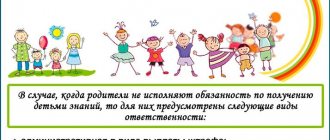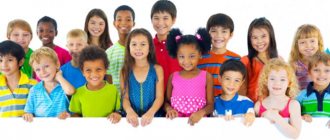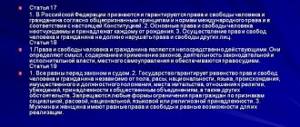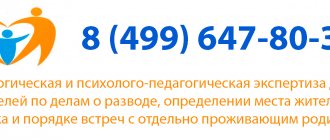The difference between the rights of a child and the rights of adults
Goals and objectives:
to show how the situation of children in the world and the country has changed over a long time; to form in students the idea that international documents on the rights of the child are the international standard for humane treatment of children in the modern world; to arouse interest in the topic of children’s rights; awaken curiosity to study documentary sources on children’s rights, as a basis for possible defense of one’s rights; develop the ability to navigate the textual material of the documents being studied.
About 100 years ago the question arose about the need to protect children's rights. And this was due to the disastrous consequences of the First World War. The question of the need to regulate children's rights arose relatively recently. So the League of Nations in 1919 created the Committee for the Welfare of Children, the purpose of which was to take action against street children, slavery, child labor, and child trafficking. Over the years, social standards for child protection have been developed. And in 1924 in Geneva, the League of Nations at its 5th session adopted the Declaration of the Rights of the Child proposed by the International Save the Children Union. This was the first international legal document in the field of protecting the rights and interests of children. It set the goals of international legal protection of children:
How do the Rights of a Child differ from the Rights of an Adult?
7. Ivan is 13 years old, Kolya is 15 years old. Compare the legal status of a 13-year-old and a 15-year-old. Select and write down the serial numbers of the similarities in the first column of the table, and the serial numbers of the differences in the second column.
The duties of a citizen are the requirements enshrined in the Constitution that are presented to each person, as a citizen, so that they act in a certain manner clearly defined by the constitutional norm (or refrain from performing corresponding actions) to ensure the interests of society, the state, other people and citizens, non-compliance with which entails subject to legal liability.
Why are the rights of a child different from the rights of an adult? What rights do you have? 2021
The duties of a citizen are the requirements enshrined in the Constitution that are presented to each person, as a citizen, so that they act in a certain manner clearly defined by the constitutional norm (or refrain from performing corresponding actions) to ensure the interests of society, the state, other people and citizens, non-compliance with which entails subject to legal liability.
The Universal Declaration of Human Rights was adopted by the UN General Assembly on December 10, 1948. The significance of this document is that it reflects human rights. To prevent the very possibility of committing/repeating a crime against humanity. It also describes the fundamental human rights and freedoms that are subject to universal respect. The Declaration has only the status of a recommendation, but on its basis two treaties binding on the parties were adopted: the International Covenant on Civil and Political Rights and the International Covenant on Economic, Social and Cultural Rights. Over the course of many years of practice, many provisions of the declaration have acquired the status of norms of customary law; in some countries the Declaration is partially recognized.
Why are the rights of the child declared in a separate document?
From the point of view of common sense, the proclamation of the rights of the child in a separate document was the right step. Firstly, you cannot compare children and adults. A minor child cannot defend his interests in legal authorities, unlike adults who have all the rights to do so. Children need the constant care of their parents, who should deal with these issues. Secondly, the attitude towards children should be somewhat different than towards adults. Thirdly, the demand from children must be different.
Based on these features, in 1959 the UN adopted the Declaration of the Rights of the Child, which is based on the principle that he should receive the best from society. This document stipulated at the international level the legal and social aspects of the protection of children, as well as issues related to their well-being.
In 1898, a convention of the UN General Assembly was held, at which the world community developed and adopted a document concerning the rights of the child. All of them are reflected in 54 articles. Its cornerstone was the assertion that the child is an absolutely independent subject of society and a full-fledged personality.
Until the beginning of the 21st century, the child did not have such rights, and until adulthood enjoyed the guardianship of his parents. That is, he was considered incompetent, and for this reason, all legal issues related to his existence in society were decided by adults at their own discretion. They chose a profession for the child, a place of study, found a job, decided at what age to start it, who to date and who to marry. It is clear that all this is stupid and very trivial, but this is how it happened, and there is no escape from it. Well, the child, deprived of his rights, simply had nowhere to go. I had to agree with the opinions of my parents and follow their instructions.
But let's look at things soberly. How did a child, other than immaturity, differ from adults? Nothing. He also had his own opinion and pride, which were strangled by adults in the bud. But a powerless person will never become a harmonious person. For this to happen, he must have the same rights as adults. At the same time, the financial and social status of the parents, living conditions, nationality should not have any influence on this process.
Having barely been born, a child is already an individual and an equal citizen of his country. He has the right to his own name and surname, life, freedom and integrity, labor, education, work, medical care. The child's last name and first name are initially given by the parents, but upon reaching the age of 14, he has the right to change them independently. The child's immunity is also guaranteed. No one should hurt him and it’s unlikely, including his parents. In modern society, this is considered a criminal offense.
A child has the right to his own opinion, which may be different from the opinion of his parents. All life changes (change of name, surname, living with mother or father, adoption) must occur only with his personal consent. Upon reaching the age of 10, the child's wishes are a priority. At the age of 14, he receives the right to independently apply to the judicial authorities to resolve legal issues.
The child also decides independently which religion to choose.
The document states that until the child reaches the age of majority, all material costs related to the maintenance of the child fall on the shoulders of his parents, and in their absence, on the guardians, which includes the state.
In addition, the child has the right: to education, to protection, to provide for his vital needs, to care.
The child also has political rights, which are also reflected in this document. He has the right: to be a member of children's and youth public organizations whose activities are focused on organizing leisure time, military-patriotic education, sports and creativity.
The document stipulates that children are prohibited from engaging in heavy physical labor. When hiring, the employer must pay attention to the age of the child and, in accordance with this, set the length of the working day and the amount of payment for him. All children, without exception, are full citizens, and therefore can enjoy social protection, which should be aimed at their health. The child can dispose of the funds earned (salary, scholarship, assistance) at his own discretion.
The choice of profession, place of study and further work is the prerogative of the child. In these matters, parents have only an advisory voice. They do not have the right to set conditions for the child and demand their unquestioning fulfillment.
Difference between child and adult
Meanwhile, children are supposed to be naughty, capricious, and have a sweet tooth. Their nervous system is actively developing, requiring a daily portion of glucose and sugars of at least 60 ml. Without sweets, a child is stunted, becomes distracted, depressed, or, conversely, overly excitable.
A child cannot independently comprehend these complex life wisdom, therefore he receives their first lessons in the form of fairy tales and parental instructions. If they do not boil down to K. Chukovsky’s good-natured exhortation “Don’t go for a walk, children, in Africa,” but are based on the example of the behavior of those closest to you, the result is sure to be positive. Children copy adults, imitating them in everything, right down to facial expressions and gestures. This feature helps the child learn not only the rules of good manners, but also languages, music lessons, school subjects, as well as achieve sports achievements at an early age and resist harmful temptations during the transitional period of adolescence.
What is the difference between the heart of an adult and a child?
By the way, about sports! Today a healthy lifestyle is in fashion, and this is good news. Everyone wants to be fit, strong, attractive, so they go to swimming pools, gyms, do aerobics, etc. Parents enroll their children in various sports sections, some simply to maintain physical fitness and improve health, others consider sports as a possible future profession for the child. The question arises: what kind of heart should a child have to play sports? And, more importantly, what should it not be?
Only a specialist can answer these questions for you. The doctor will listen to the child’s heart, order an electrocardiogram (ECG), and, if necessary, prescribe other types of examination. If a child is going to seriously engage in sports, then it is advisable to do not only an ECG, but also an echocardiogram or ultrasound of the heart . It should be noted that not everyone is born for big-time sports. Extensive physical activity is also contraindicated if the child has foci of chronic infection, such as chronic tonsillitis, sinusitis, or multiple caries. Even after suffering a banal viral infection, children should not play sports, pass standards, take part in cross-country races, etc. for two to three weeks.
Comparison of the measure of freedom of adults and children: distinctive features
If children are free from legal responsibility, then adults are responsible for their actions starting from the age of eighteen. There are a number of other differences in determining the measure of freedom for adults and children:
- The age range of children is limited by the date of his birth and the day on which he turns eighteen. On this day, society recognizes that he becomes a full citizen.
- Until then, children are entirely dependent on adults.
- Children cannot completely solve all problems on their own; parents are concerned about this.
- Elders conduct serious business, children learn about the world through play.
- Adults have rights and responsibilities that are regulated by civil rights. The legal capabilities of children are determined by government agencies and international organizations.
- An adult is obliged to raise his children. Children, in turn, only sometimes act as educators, determining the necessary measure of individual responsibility for personal behavior.
GREAT RIGHTS FOR SMALL CHILDREN"
- Study the UN Convention on the Rights of the Child.
- Study the material through the eyes of artists and writers “On the Rights of the Child.”
- Creating conditions for the development of legal competence in children.
- Familiarizing children in a form appropriate to their age with social and legal norms and rules of behavior.
- Raising in children a respectful and tolerant attitude towards people, regardless of their origin, language, gender, age.
The Convention proclaims the rights of children to a name, citizenship, love, understanding, material security, social protection, and the right to develop physically, mentally, morally and spiritually in conditions of freedom and respect. The child must receive timely assistance and be protected from all forms of neglect, cruelty, and exploitation. But, despite such a considerable period of publication of this main document, it is still little known not only to parents, but also to teachers
It is necessary to disclose to adults the importance of the document. And, what is much more difficult, to rebuild the initial view of the child
It is difficult for many adults to understand and accept that a child is an equal person with them, having the right to their own actions and opinions. His right, like the right of any person, must be respected and not violated.
09 Jun 2021 uristland 89
HUMAN RIGHTS: Children's rights
Physical violence means any blows, spankings, hair pulling, ear twisting, as well as any deliberate infliction of pain or any harm to a child’s health (traditional operations, pulling out or sharpening teeth, bandaging feet and similar methods of “correcting” natural characteristics). ).
The second - fundamental - article of the Convention states: “All children have the same rights and equal value. No one should be discriminated against." The rights are the same, the children are different. It is as difficult to provide them all with equal well-being as it is convenient to seat children of different heights and development. There is only one way out: those who are smaller should be given higher chairs, those who cannot walk should be given comfortable strollers, etc. The same applies to rights - children whose capabilities by nature or due to life circumstances differ from the norm, need to be given additional rights to ensure their access to the basic benefits of life. This is called "affirmative action" or "positive discrimination."
Why the rights of a child are different from the rights of an adult: basic principles of the convention
But, unfortunately, the interests of the baby are interpreted differently. When handling them, a certain negativity may appear. Thus, a child who has been physically abused grows up with a developed sadistic mindset. Such children begin to raise their own children in the same way.
All children have the right to life and development. The main responsibility of parents is to do everything possible to ensure that the child has the opportunity to develop normally and realize his own abilities and skills. At the same time, the state must offer parents all possible assistance, support and advice on certain issues.
How does an adult differ from a child - physical features: comparison, distinctive features
It was physical development that was put in the first section because it is the most noticeable among other differences between adults and children. Visually, even grown-up teenagers differ in height, body weight and other external signs from babies. A child is a fragile creature whose body, immune system and organs are just developing and growing.
Thoughts of children and adults
The older generation has greater forms compared to the younger ones and their strength is directed in the right direction.
The child has:
- Still undeveloped coordination of not only legs, arms, but also visual organs.
- The skin of children is much thinner than the epidermis of adults. Babies are more often at risk of losing moisture and heat through the skin. They are more often affected by toxins that penetrate the skin.
- Baby cells are more active, which is why they grow. Children are more susceptible to the effects of radioactive radiation.
- The child’s immune system is not yet fully formed and therefore it fails more often than in older people.
Differences between children and adults
IMPORTANT : It is adults who must be responsible for the child. Because children need support.
What rights does a child have under the Constitution of the Russian Federation?
3. The right to health protection and medical care. For the state of the Russian Federation, protecting children's health is the main factor of development. Regardless of social status, a child has the right to receive medical care in any public medical institution. It is also worth noting that children who are not yet adults, but are over fifteen years old, have the right to decide for themselves whether or not to agree to medical intervention.
2. The right to freedom and personal security. This right is the foundation of a person’s legal set. Freedom means the opportunity to live the way one wants, but on the condition that it does not harm others. We can say that freedom is the opposite of such concepts as slavery and coercion. Regarding children, it is worth saying that the Constitution of the Russian Federation prohibits the exploitation of children, as well as their abduction and trafficking.
Children's rights - are they equal to the rights of adults?
The Universal Declaration of Human Rights states that all people are equal and free from the very first day of their birth (Article 1) [2]. At the same time, the rights of a child and the rights of an adult citizen of any country are not at all the same thing.
How do citizens participate in the political life of their state? Only those persons who have reached a certain age or majority can take part in elections. Thus, in Ancient Greece, all free men who were 12 years old were considered adults [4, p. 140]. Almost now in many countries of the world it is possible to express one’s opinion and participate in voting only after a person turns 18 years old.
Consequently, a small child who is not yet 18 years old does not have the right to everything that his parents have the right to. So why are the rights of a child different from the rights of an adult? And where does such inequality come from?
A person realizes his rights in cases where he does not infringe on the rights of other people. Both children and adults have human rights and responsibilities, the only difference is that adults know and are more capable, and therefore bear more responsibility.
The famous humanist teacher and writer Janusz Korczak pointed out that children are no stupider and no worse than adults - they simply lack experience [5]. Of course, children do not have much life experience, and it is very difficult for them to independently take responsibility for their actions in our modern world.
Children are not only more inexperienced, but also weaker than adults. Therefore, the rights of the former are protected by special additional measures - such as the Constitution of the Russian Federation (Article 38) [1], the UN Convention on the Rights of Children [3].
So what rights and responsibilities do minors have?
1) right to life. Any attempts to harm his health are prosecuted by law;
2) the right to receive a name;
3) from childhood, everyone has the rights to freedom and personal integrity, which implies the absence of serious punishment and torture;
4) the right to education;
5) in a number of situations when the help of specialists is required, for example, doctors, psychologists, children have an advantage over adults in receiving support;
6) children have property rights and responsibilities from an early age, because they can receive an inheritance or large gifts, but adult representatives act on behalf of the child;
7) express one’s opinion, which in certain situations is taken into account even in court, is also one of the rights of a minor.
The rights and responsibilities of the child at home are mainly determined by the parents. But, of course, the demands of mom or dad should not contradict current legislation.
In addition to rights, interests and needs, children also have responsibilities. Thus, every child has the right to education. At the same time, he has the responsibility to attend school, do homework, and listen to teachers.
Every child has the right to demand respect for his own rights, but he must also respect and consider the rights of other children and adults.
The state controls the issue of protecting the rights of minors even when studying at school. Teachers have these functions. They not only teach the child, but also conduct educational conversations, both in and outside of class, as well as during class hours.
If any violation is noticed regarding the rights of one of the students, the teacher is obliged to take appropriate measures.
So, we can conclude: the rights of a child differ from the rights of an adult not because children are stupider or worse than adults, but because they simply lack life experience and certain knowledge. The older a person gets, the more rights and responsibilities he acquires.
Today in our country, children have many of the same rights as adults. Both children and adults have the right to life, to be protected from violence, to be treated with dignity, to have relationships with family members and loved ones, to have favorable cultural, physical and socio-economic conditions for development, and to defend their own views.
Literature:
- Constitution of the Russian Federation. [Electronic resource]: fundamental law of the Russian Federation. Access mode: https://www.constitution.ru/10003000/10003000–4.htm.
- Universal Declaration of Human Rights. [Electronic resource] / Universal Declaration of Human Rights. Access mode: https://www.un.org/ru/documents/decl_conv/declarations/declhr.shtml.
- Convention on the Rights of the Child. [Electronic resource] / Convention on the Rights of the Child. Access mode: https://www.un.org/ru/documents/decl_conv/conventions/childcon.shtml
- Botninnik M.N., Kallyastov D.P. and others. In the Athenian school [Text] / D.P. Kallyastov, M.N. Botvinnik and others // Ancient Greece. A book to read. M.: “Enlightenment”, 1974. pp. 140–141.
- Korczak J. Open window. The child's right to respect. Disdain or mistrust. The child's right to be himself. [Electronic resource] / Ya. Korczak. Access mode: https://www.gumer.info/bibliotek_Buks/Pedagog/galag/32.php.
Children's rights - all about children's rights
The issue of protecting children from various types of violence arose most acutely in 1924. It was then that the Declaration of the Rights of the Child was created, which became the basis for the International Convention signed in 1989. Why is the issue of children's rights proclaimed in a separate document? The answer is obvious. Because he is weaker than adults, cannot defend himself and is the first to come under attack in the event of military disasters and economic crises.
- Rights of a child in kindergarten:
- to safety, integrity and respect for the individual - educators do not have the right to shout at the child, raise him by force, force him to do anything or insult him.
- to develop abilities - educators should conduct classes on the development of speech, creative and physical abilities.
- for medical care - if necessary, the pupil must receive medical care.
- At school:
- for training according to general or individual plans;
- for use of the library and canteen;
- for comfortable and safe learning conditions - school premises must comply with sanitary standards and not pose a health hazard;
- to attend additional classes (both paid and free);
- to the help of a psychologist and teacher;
- for medical care.
- On the street:
- to freedom of movement;
- for safety;
- for the use of playgrounds, parks, etc.
What rights does a child have in the Russian Federation?
For these purposes, the child is provided with free medical care in state (municipal) institutions, including the prevention of various diseases, diagnosis and treatment, rehabilitation, sanatorium treatment and health improvement for children.
For this purpose, the Labor Code of the Russian Federation establishes appropriate rules, in particular determining the age at which a child can be hired, the length of his working day, the prohibition of performing certain types of work, etc.










